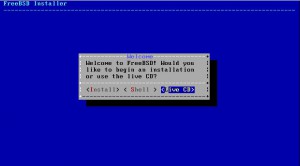This is partly based on the excellent guide at http://daemon-notes.com/articles/system/install-zfs/begin.
Boot with FreeBSD 9.1 installer and select Live CD when the installer starts.

Identify the disks you want to install to. SATA disks are named /dev/adaX and USB pendrives and SCSI drives are named /dev/daX.
dmesg|egrep (ada|da)Of which output could look like this:
da0 at mpt0 bus 0 scbus2 target 0 lun 0
da0: <VMware Virtual disk 1.0> Fixed Direct Access SCSI-2 device
da0: 320.000MB/s transfers (160.000MHz, offset 127, 16bit)
da0: Command Queueing enabled
da0: 8192MB (16777216 512 byte sectors: 255H 63S/T 1044C)
da1 at mpt0 bus 0 scbus2 target 1 lun 0
da1: <VMware Virtual disk 1.0> Fixed Direct Access SCSI-2 device
da1: 320.000MB/s transfers (160.000MHz, offset 127, 16bit)
da1: Command Queueing enabled
da1: 8192MB (16777216 512 byte sectors: 255H 63S/T 1044C)
Partitioning the drives using GPT
Create the partitions on the disk, making sure to properly align them using 4k blocks. The first partition containing the bootblock won’t need that.
gpart create -s gpt ada0
gpart add -b 34 -s 64k -t freebsd-boot ada0
gpart add -s 2G -a 4k -t freebsd-swap -l swap0 ada0
gpart add -a 4k -t freebsd-zfs -l disk0 ada0
Then do the same for the second disk.
gpart create -s gpt ada1
gpart add -b 34 -s 64k -t freebsd-boot ada1
gpart add -s 2G -a 4k -t freebsd-swap -l swap1 ada1
gpart add -a 4k -t freebsd-zfs -l disk1 ada1
Verify the disks are partitioned correctly.
gpart showThey should now look like this:
=> 34 16777149 da0 GPT (8.0G)
34 128 1 freebsd-boot (64k)
162 6 - free - (3.0k)
168 4194304 2 freebsd-swap (2.0G)
4194472 12582704 3 freebsd-zfs (6G)
16777176 7 - free - (3.5k)
=> 34 16777149 da1 GPT (8.0G)
34 128 1 freebsd-boot (64k)
162 6 - free - (3.0k)
168 4194304 2 freebsd-swap (2.0G)
4194472 12582704 3 freebsd-zfs (6G)
16777176 7 - free - (3.5k)
Add bootcode to the disks.
gpart bootcode -b /boot/pmbr -p /boot/gptzfsboot -i 1 ada0
gpart bootcode -b /boot/pmbr -p /boot/gptzfsboot -i 1 ada1
Creating the ZFS filesystems
Set up the disks as two-way mirror, essentially raid-1.
zpool create -o altroot=/mnt -o cachefile=/var/tmp/zpool.cache zroot mirror /dev/gpt/disk0 /dev/gpt/disk1The zpool then looks like this:
pool: zroot
state: ONLINE
scan: none requested
config:
NAME STATE READ WRITE CKSUM
zroot ONLINE 0 0 0
mirror-0 ONLINE 0 0 0
gpt/disk0 ONLINE 0 0 0
gpt/disk1 ONLINE 0 0 0
errors: No known data errors
ZFS filesystems
zfs create -o compression=on -o setuid=off zroot/tmp
chmod 1777 /mnt/tmp
zfs create zroot/usr
zfs create zroot/usr/home
cd /mnt
ln -s usr/home home
cd -
zfs create zroot/usr/local
zfs create -o compression=on -o exec=off -o setuid=off zroot/usr/src
zfs create zroot/var
zfs create -o exec=off -o setuid=off zroot/var/backups
zfs create -o compression=on -o exec=off -o setuid=off zroot/var/crash
zfs create -o exec=off -o setuid=off zroot/var/db
zfs create -o compression=on -o exec=on -o setuid=off zroot/var/db/pkg
zfs create -o exec=off -o setuid=off zroot/var/empty
zfs create -o compression=on -o exec=off -o setuid=off zroot/var/log
zfs create -o compression=on -o exec=off -o setuid=off zroot/var/mail
zfs create -o exec=off -o setuid=off zroot/var/run
zfs create -o compression=on -o setuid=off zroot/var/tmp
chmod 1777 /mnt/var/tmp
In my environment /usr/ports is mounted via NFS from a package building server. For a local /usr/ports the following need also to exist.
zfs create -o compression=on -o setuid=off zroot/usr/ports
zfs create -o exec=off -o setuid=off zroot/usr/ports/distfiles
zfs create -o exec=off -o setuid=off zroot/usr/ports/packages
Then set it bootable and copy the important zpool.cache onto the filesystem, that it will find the zpool upon boot.
zpool set bootfs=zroot zroot
mkdir -p /mnt/boot/zfs
cp -p /var/tmp/zpool.cache /mnt/boot/zfs/zpool.cache
Install FreeBSD
Extract the distfiles.
cd /mnt
for dist in base.txz kernel.txz lib32.txz; do
tar -xzf /usr/freebsd-dist/$dist
doneCreate a couple of necessary configuration files
cat << EOF > /mnt/boot/loader.conf
zfs_load="YES"
vfs.root.mountfrom="zfs:zroot"
EOF
echo 'zfs_enable="YES"' >> /mnt/etc/rc.conf
Only the swap devices need to exist in the /etc/fstab. All other filesystems are mounted by zfs.
cat << EOF > /mnt/etc/fstab
# Device Mountpoint FStype Options Dump Pass
/dev/gpt/swap0 none swap sw 0 0
/dev/gpt/swap1 none swap sw 0 0
EOF
zfs set readonly=on zroot/var/empty
shutdown -r nowYou now have a mirrored ZFS-only FreeBSD system with GPT disks!


Recent Comments